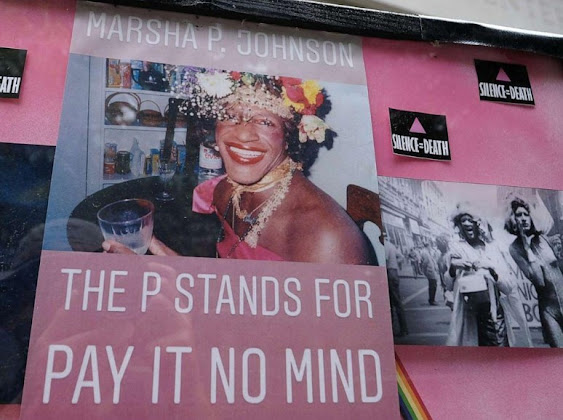Marsha P. Johnson, a Black, transgender woman, was an important figure in the gay rights movement.
Marsha
P. Johnson was one of the most prominent figures of the gay rights movement of
the 1960s and 1970s in New York City. Always sporting a smile, Johnson was an
important advocate for homeless LGBTQ+ youth, those effected by H.I.V. and
AIDS, and gay and transgender rights.
Johnson
enjoyed wearing clothes made for women and wore dresses starting at age five.
Even though these clothes reflected her sense of self, she felt pressured to
stop due to other children’s bullying and experienced assault at a young age.
Immediately after graduating from Thomas A. Edison High School, Johnson moved
to New York City with one bag of clothes and $15.
Once in
New York, Johnson returned to dressing in clothing made for women and adopted
the full name Marsha P. Johnson; the “P” stood for “Pay It No Mind,” a phrase
that became her motto. Johnson described herself as a gay person, a
transvestite, and a drag queen and used she/her pronouns; the term
“transgender” only became commonly used after her death.
Johnson’s
life changed when she found herself engaging with the resistance at The
Stonewall Inn on June 28, 1969. The raid on Stonewall galvanized the gay rights
movement. The first Gay Pride Parade took place in 1970 and a series of gay
rights groups—including the Gay Liberation Front, a more radical organization,
and the Gay Activist Alliance, a more moderate and focused spin-off group
emerged. Johnson was involved in the early days of both but grew frustrated by
the exclusion of transgender and LGBTQ+ people of color from the movement. Throughout
the 1970s, Johnson became a more visible and prominent member of the gay rights
movement. Despite her joyous personality and ever-present smile, Johnson
experienced hardship. She never let her personal setbacks stop her advocacy. In
the 1970s, Johnson experienced a series of mental health breakdowns and spent
time in and out of psychiatric hospitals.
On July
6, 1992, Johnson’s body was found in the Hudson River. She was 46. Initially
ruled a suicide, many friends questioned that conclusion and suspected foul
play. At the time, 1992 was the worst year on record for anti-LGBTQ violence
according to the New York Anti-Violence Project. In 2012, the New York Police
Department reopened the case into Johnson’s death.
In 2019, New York City announced that Marsha P. Johnson, along with Rivera, would be the subject of a monument commissioned by the Public Arts Campaign “She Built NYC.” The monument will be the first in NYC to honor transgender women. In 2020, New York State named a waterfront park in Brooklyn for Johnson. Johnson is also now the subject of many documentaries. She remains one of the most recognized and admired LGBTQ+ advocates.





Comments
Post a Comment